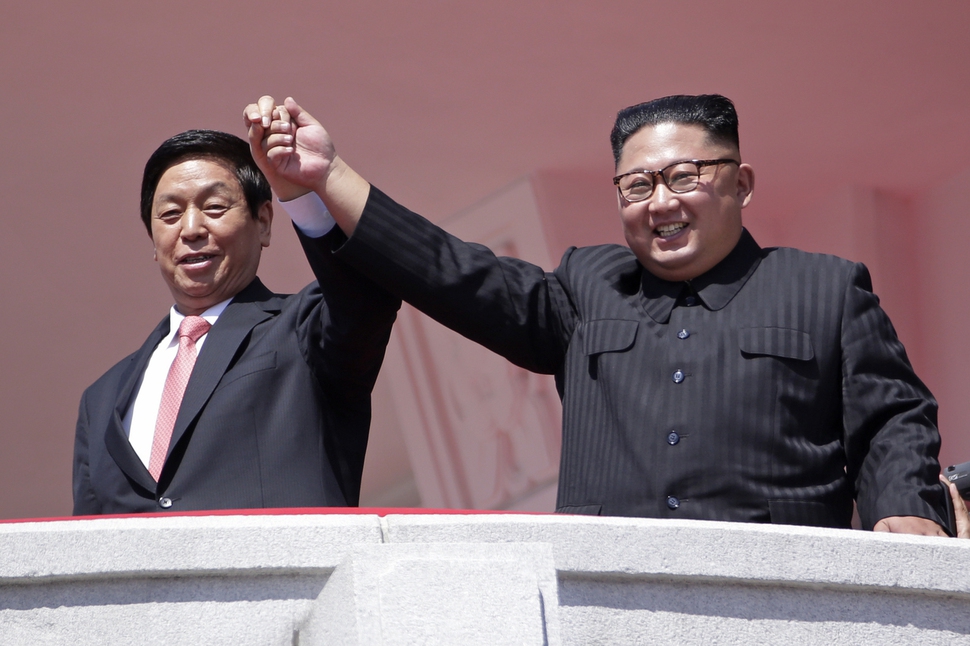Posted on : Sep.10,2018 16:57 KST
Modified on : Sep.10,2018 17:23 KST
 |
|
A tank unit passes by as part of North Korea’s military parade at Kim Il-sung Square in Pyongyang on Sept. 9, the day of the foundation of the North Korean government. (Yonhap News)
|
Trump said he received letter from Kim prior to event
No intercontinental ballistic missiles (ICBMs) appeared in the military parade on Sept. 9 that celebrated the 70th anniversary of the establishment of the North Korean government. North Korea was presumably using this understated presentation to reconfirm that it has no intention of threatening the US.
Prior to this, US President Donald Trump said he’d been delivered a letter from North Korean leader Kim Jong-un. The talks between North Korea and the US that have resumed since South Korean President Moon Jae-in’s special delegation visited North Korea on Sept. 5 are expected to gain even more momentum.
Kyodo News and other foreign media organizations reported that North Korea did not display any of its strategic weapons – such as the Hwasong-15 ICBM, which could directly target the US – during its military parade at Kim Il-sung Square in Pyongyang on Sept. 9, the Day of the Foundation of the Republic. They appear to have been omitted out of respect for North Korea’s continuing dialogue with the US to break through their deadlock over denuclearization measures and the end-of-war declaration.
“North Korea’s attitude appears to be in line with its measures to freeze missile test launches and shut down its missile engine test site since its summit with the US on June 12,” said a diplomat who is familiar with the negotiations between the two countries. “This shows that North Korea is firmly committed to reaching a breakthrough through negotiations.”
 |
|
North Korean leader Kim Jong-un with Li Zhanshu, Chairman of the Standing Committee of China’s National People‘s Congress, in Pyongyang on Sept. 9, North Korea’s foundation day. (AP/Yonhap News)
|
North Korea’s determination to resume negotiations is also apparent in an editorial in the state-run Rodong Sinmun that assessed the day’s significance. An editorial titled “Country of a Great People” that ran on the second page said, “The brilliant victories during the 70-year history of our Republic have created the world’s greatest political and military strength that eternally guarantee the independent lifestyle of our people and the happiness of future generations. Now that our country has seized the ‘treasured sword’ that will bring peace and prosperity for generations to come, it is only a matter of time before we become a strong economy.”
Notably, the editorial emphasized achieving the goal of a strong economy while making oblique, instead of direct, references to the country’s nuclear and missile capabilities. The North’s mention of a goal that cannot be achieved without the international community relaxing the economic sanctions on the North that were triggered by its repeated nuclear weapon tests appears to show the strength of its commitment to denuclearization talks with the US.
Prior to this, Kim had sent a personal letter to Trump, restarting the “correspondence diplomacy” between the two leaders. On Sept. 7, Trump told reporters on Air Force One that a letter from Kim had crossed the border the day before. Trump expressed his expectations for the letter, which he said he thinks will be “positive.”
Kim’s letter was delivered shortly after Kim laid out a timeframe for denuclearization during Trump’s first term in office to Blue House National Security Office Director Chung Eui-yong and other members of a South Korean special delegation to the North amid strained talks between the US and North Korea over denuclearization and an end-of-war declaration that had led to the cancellation on Aug. 24 of a planned visit to North Korea by US Secretary of State Mike Pompeo.
Depending on Trump’s response, this could lead to talks aimed at organizing a second North Korea-US summit. Discussion about arranging another North Korean trip for Pompeo is also likely to resume.
National Security Advisor Suh Hoon, who was a member of the special envoy delegation to North Korea, departed from Japan via Gimpo Airport on Sept. 9. On the morning of Sept. 10, Suh is planning to pay a visit to Japanese Prime Minister Shinzo Abe and explain the results of the special delegation’s visit to the North. The day before, Chung Eui-yong, the leader of the special envoy delegation, visited China and presented the outcome of the trip to Chinese State Councilor Yang Jiechi. Since the special delegation’s visit, the pace of dialogue aimed at achieving denuclearization and building a peace system on the Korean Peninsula has been accelerating.
By Yoo Kang-moon, senior staff writer
Please direct comments or questions to [english@hani.co.kr]








